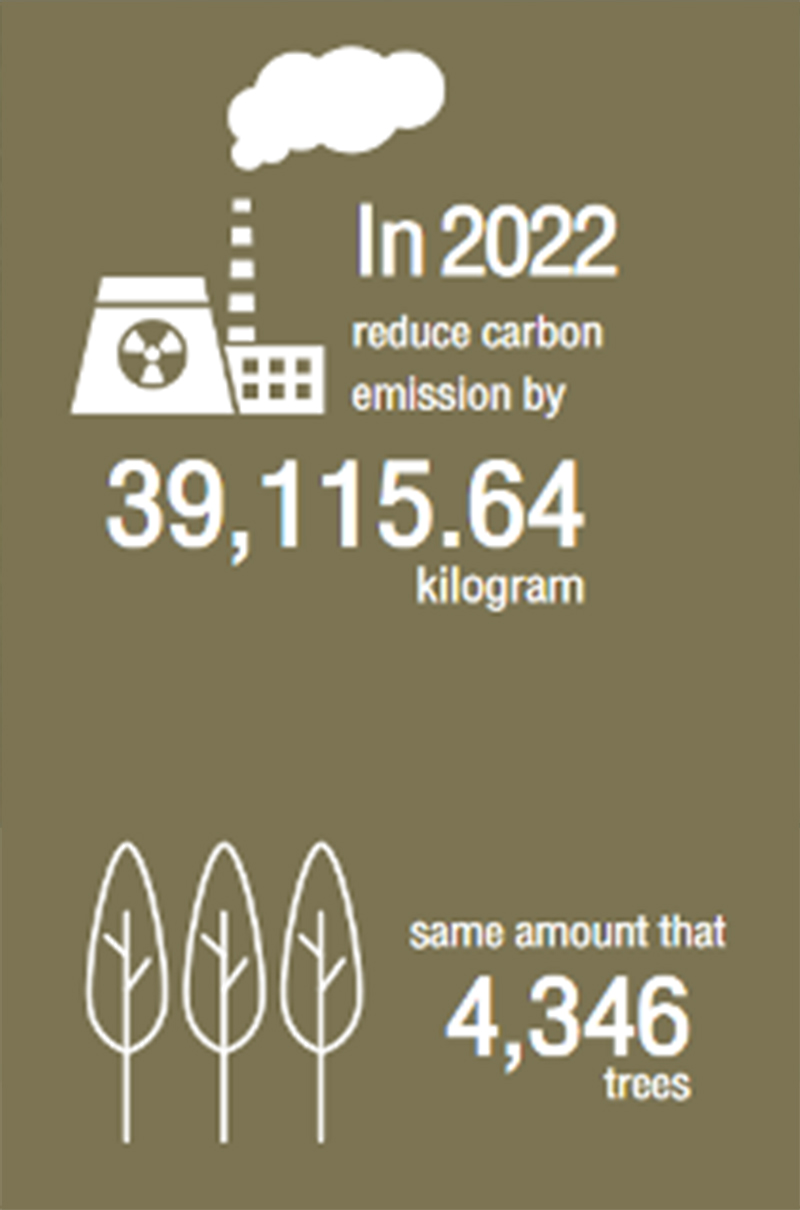In 2022 the Company aimed to deliver value to stakeholders throughout the value chain keeping in mind sustainability of the business and its “boutique” identity.
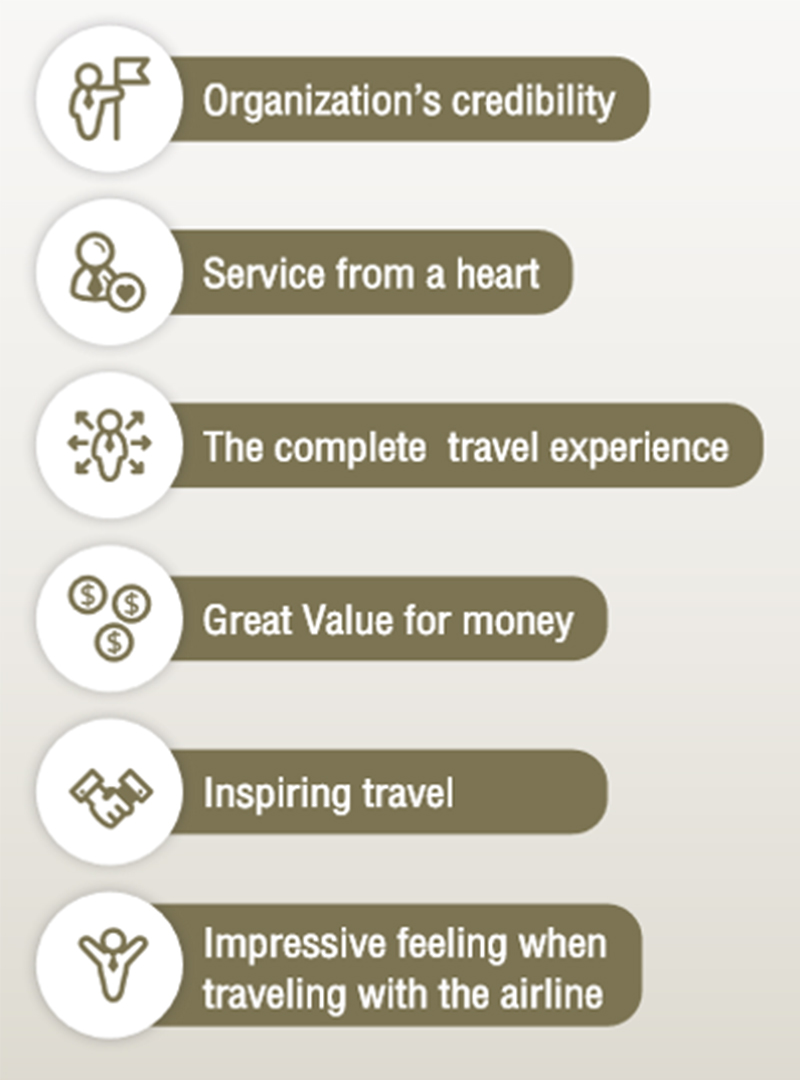
The Company, with commitment to drive sustainable business and respond to various challenges both at present and in the future, has established Corporate Sustainability Policy for the year 2022. This policy is driven by a strong determination to achieve business sustainability and is aligned with the Company's vision "To be the leading airline in Asia”.
Deliver happiness through impressive travel experience
In 2022 the Company aimed to deliver value to stakeholders throughout the value chain keeping in mind sustainability of the business and its “boutique” identity.

The Company examined value chain which is a series of connected activities from the beginning to the end with a view to develop and upgrade the ability to correctly respond to the need or expectation of stakeholders. Five primary activities can be summarized as follows.

The Company identified corporate sustainability issues in 2022, derived from analyzing various sustainability issues throughout the value chain, along with the relevant context of the industry group covering all three dimensions: environmental, social, and governance. This process involves the following steps:
1.1 Internal factor includes the organization's direction, value chain concerns, key issues identified through collaborative workshops conducted by corporate sustainability management committee, and organizational risks.
1.2 External factor includes global sustainability trends and directions, stakeholder needs and expectations.
The Company ranks key issues identified by assessing their significance based on the severity of potential impacts in each dimension. The ranking considers financial implications, customer impact, business disruptions, reputation/ image, and regulatory compliance which based on the criteria for assessing organizational risk levels.
Sustainability issues derived from the analysis and prioritization are presented to and approved by the Company's board of directors meeting held on 26 May 2022. The information is then communicated to stakeholders and a review process is scheduled annually.
Materiality topics (2022)
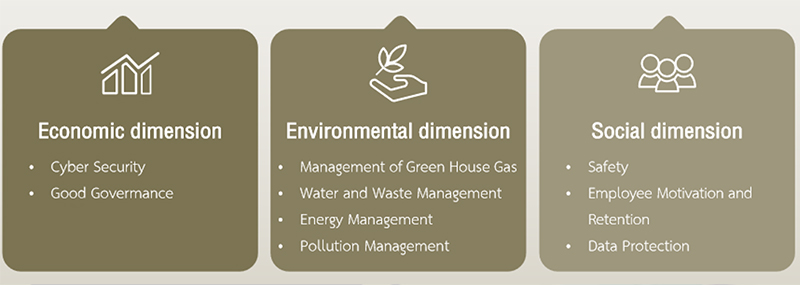
Based on materiality topics, the following strategies are developed for achieving sustainability.
Objective: To create a culture for recording, measuring, analyzing, and storing data correctly to benefit data processing. Processed data helps executive to make the right business decision.
Objective: To upgrade knowledge learning throughout the organization by promoting and providing appropriate learning environment, ensure concrete management of knowledge, develop work potential of employees under context of changes in business.
Objective: To increase value of products and services by efficient use of resources to ensure minimum impact on the environment.
The Company is considering materiality topics and their alignment with the Sustainable Development Goals (SDGs) defined by the United Nations. The following are the summarized eight SDGs that are relevant to the organization's sustainable development objectives: SDG 6 (Clean Water and Sanitation) SDG 7 (Affordable and Clean Energy) SDG 8 (Decent Work and Economic Growth) SDG 11 (Sustainable Cities and Communities) SDG 12 (Responsible Comsumption and Production) SDG 13 (Climate Action) SDG 16 (Peace Justice and Strong Institution) and SDG 17 (Partnerships for the Goals)

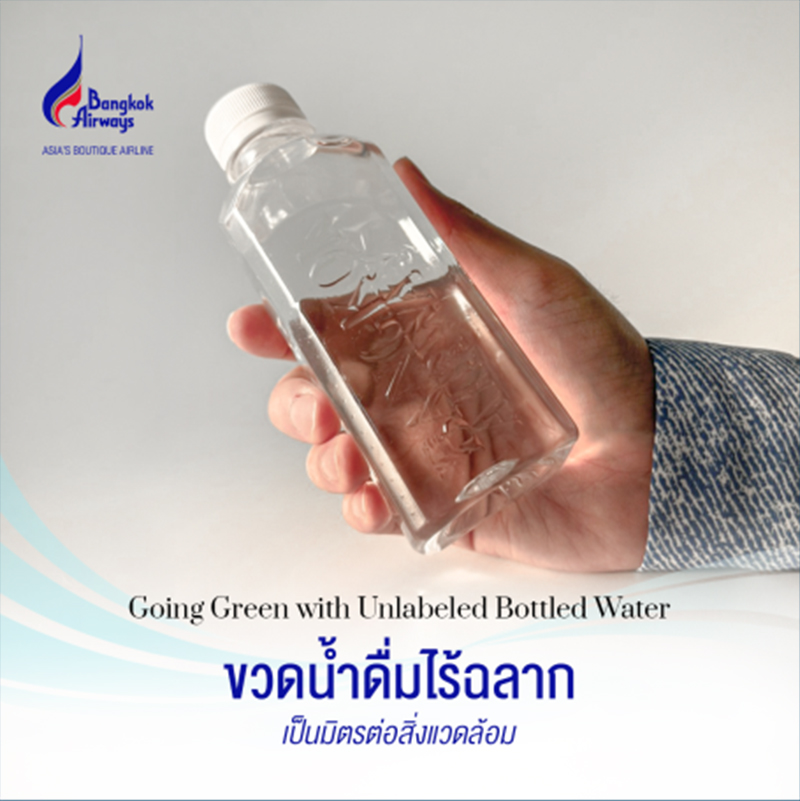
"Unlabeled Bottled Water" (using the technique of embossing details on the bottle instead of using plastic labels) is a new alternative provided by the Company on flights in 2022. It helps facilitate the recycling process of plastic bottles by eliminating the need for label separation. Furthermore, based on the number of passengers using the airline service in 2022, the use of unlabeled bottled water can potentially reduce the production of plastic labels by more than 3 million pieces.
"Pilot World Application" is an innovative project developed within the Company as part of the award-winning competition for creative ideas, "PG Innovation Award Project (Season 2) - 2019". This system serves as a centralized One Stop Services for pilots, providing essential pre-flight information. It includes checking specialized training data from the Civil Aviation Authority of Thailand as mandated by the regulations, requesting documents electronically through forms for various purposes, and conducting aviation-related checks regarding fuel usage. The aim is to promote awareness, enhance resource efficiency, and enhance responsible resource utilization with utmost focus on safety as the ultimate goal.
Benefits of developing the Pilot World Application for organizational use include:
Environmental Benefits
Senior management of the Company emphasizes the importance of quality service management within the organization. They collaborate to carefully consider and establish a Quality Policy that is aligned with the organization's purpose, context, and strategies in the aviation industry, as well as complied with relevant laws and standards pertaining to the aviation business. This Quality Policy serves as a framework for defining the Company's Quality Objectives at the organizational level. These objectives serve as targets for controlling the quality of service delivery according to the Company's quality management system.
The Quality Policy of the Company is documented as a quality document and requires approval from the highest-level executives. It also includes a system for controlling quality documents as per the requirements of the quality management system, as well as a communication system to ensure employees throughout the Company are aware of and understand the policy. Additionally, it is ready for dissemination of information to stakeholders.
Furthermore, the Company's Quality Policy undergoes periodic review and evaluation by senior management at least twice a year. This is done to continuously improve and develop work processes and the quality management system in service delivery, following the requirements of the applied quality management system within the Company.
Quality control process to meet established standards:
These quality documents adhere to established principles and methods for developing the Company's quality documents, ensuring clarity and standardization. The Company also implements its own Document Control System (PGE-ISO) to facilitate quick and convenient access to and understanding of various work documents, in line with ISO 9001:2015 requirements and other applicable standards endorsed and applied by the Company.
Internal audits within the Company cover all dimensions related to the Company's airline business, including safety standards, quality management systems, internal control, and information systems.
External audits involve the assessment of safety standards and quality management systems.
The certification body (CB) that evaluates and certifies the Company's ISO 9001:2015 Quality Management System is United Registrar of Systems (Thailand) Ltd., known as United Registrar of Systems (URS). URS is accredited by UKAS (United Kingdom Accreditation Service) and IATF (International Automotive Task Force). URS has also been appointed as a certified food business establishment by the Food and Drug Administration (FDA). URS conducts regular audits of the Company according to the defined audit cycle:
Despite the impact of the COVID-19 situation, URS, as the certification body, has been able to perform document reviews and on-site audits of operational practices at various units and stations according to the planned schedule. The surveillance visit conducted by URS in 2022 did not identify any non-compliance issues (NC) or major breakdowns that would affect the Company's quality management system. This allows the Company to maintain its ISO 9001:2015 certification.
Since the Company’s establishment, ethic, honesty, justice and law are upheld by the Company in conducting the business. The Company has developed Code of Business Conduct to serve as a guiding principle and framework for consistent business practices which are composed of Ethics of Directors and Advisors, Ethics of Employees, Ethics to Stakeholders; report of the illegal practices, violation of Code of Conduct, complaints and report of traces. As the Company’s reputation is one of the most important essences of the Company. This Code of Conduct will promote the implementation of such values and practices in conducting the Company’s business continuously.
In 2022, the Company produced and distributed questionnaire on “Compliance with Ethical Business Practice” to all employees so as to promote corporate good governance principle and to comply by Sustainability Policy. Completed questionnaires are kept as the employees’ training record.
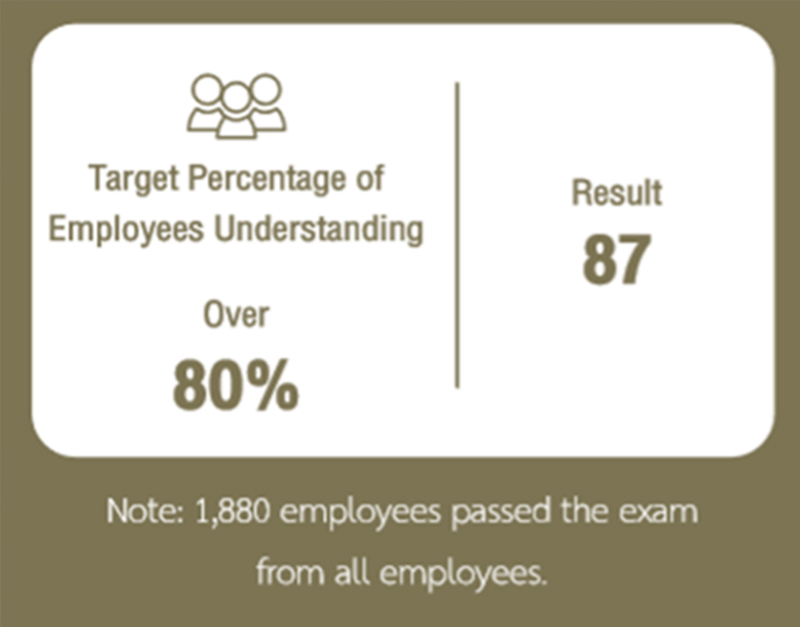
The objective of the Company regarding community relations is “to aim for the strengthening of the communities surrounding the airports and flight routes" through five dimensions: economy, society, education, environment, and health. This includes taking care of, monitoring, and improving the Company's processes that may pose negative impacts on the community. Additionally, it involves building and maintaining relationships with the community and participating in community development efforts for sustainable coexistence.
The community engagement initiatives conducted by the Company in the year 2022 include:
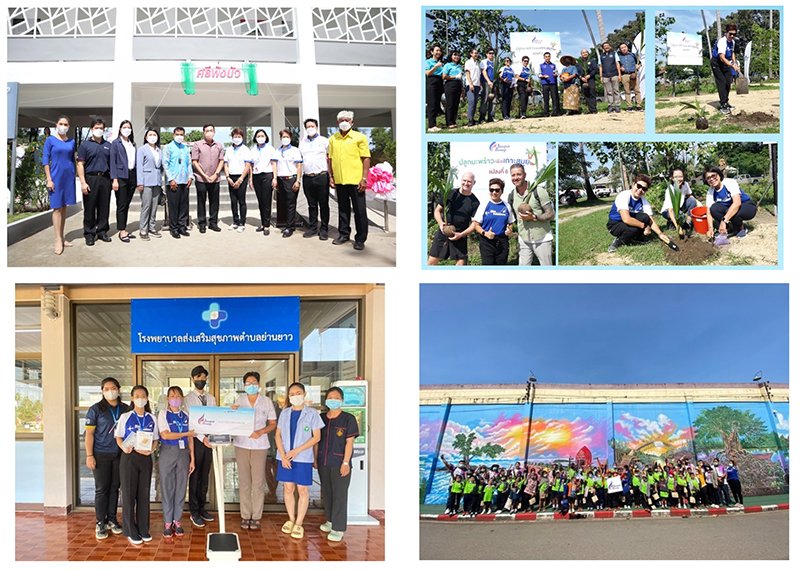
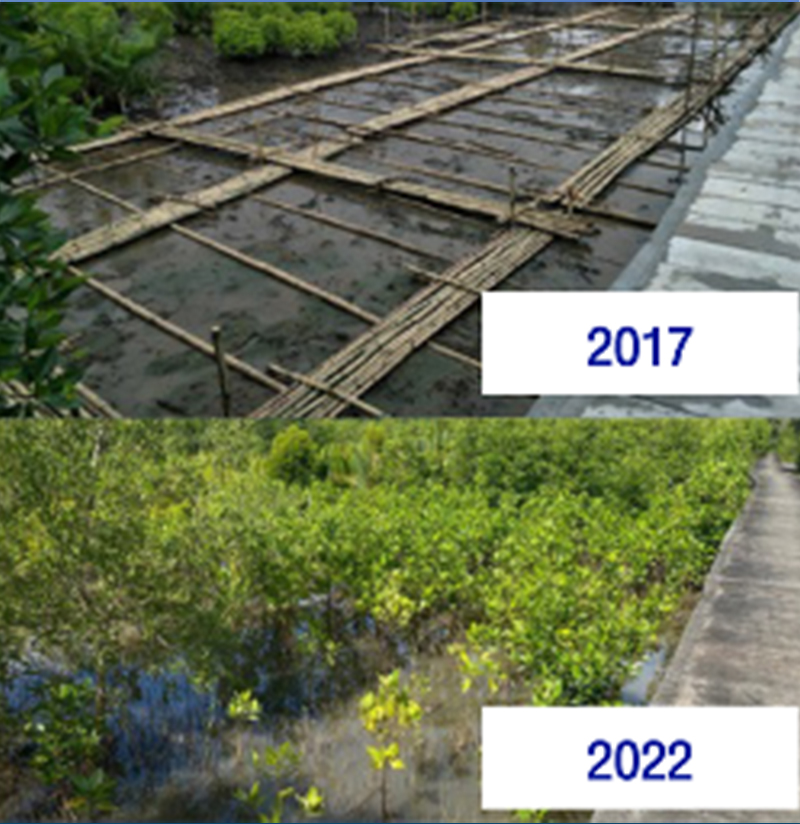
The Company operates airport business and commercial aviation business which are categorized under the air transport project. Thus, The Company is required to prepare an Environment Impact Analysis report following the announcement of the Ministry of Natural Resources and Environment, approved by the Environment Impact Analysis Specialist Committee on the infrastructure as well as all other aspects.
From the consensus of all three airport projects namely Samui Airport, Sukhothai Airport, and Trat Airport; these airports must strictly follow the measurements on prevention, impact minimization, and impact monitoring on the environment every six months. By following these measures, the impacts on the environment covers four categories namely physical environment resources, biological environment resources, value on benefits to human being, and value to quality of life. It’s important to monitor the quality of the environment in many aspects such as air quality, noise level, vibration, water quality on the soil surface, water quality under the soil, wildlife resources, biological marine resources, social and economic condition and public participation. By following these measures, the airports can perceive impacts they cause on the environment. Thus, they could rectify any shortcomings promptly.
With an eye to top environmental issues, the Company takes climate crisis management very seriously. Recently, Bangkok Airways has been implementing the efficiency jet-fuel management projects in order to reduce CO2 emissions. In addition to that, the airline has also joined the Carbon Offsetting and Reduction Scheme for International Aviation (CORSIA) by ICAO, to support the objectives to lower CO2 emissions for international flights and to curb the aviation impact on climate change. The aim is to achieve Net Zero Carbon Emission by 2050.
Moreover, the Company also plans to set foot in other sustainability dimensions such as renewable energy studies; assessment of the carbon footprint of the organization, the development plans for the waste separation project, and upcycling projects.
The "Care the Bear" project, in which the Company participated with the Stock Exchange of Thailand, started in 2018 and continues until the present. This project supports the reduction of greenhouse gas emissions through various events conducted by the Company, both online and onsite. The project utilizes the principles of the 6 Cares framework to assess and measure the results and create sustainable behavioral changes within the organization. In 2023, the Company contributed to a reduction of 39,115.64 kilograms of carbon dioxide equivalent through the project, which is equivalent to the annual carbon dioxide absorption of 4,346 trees.
